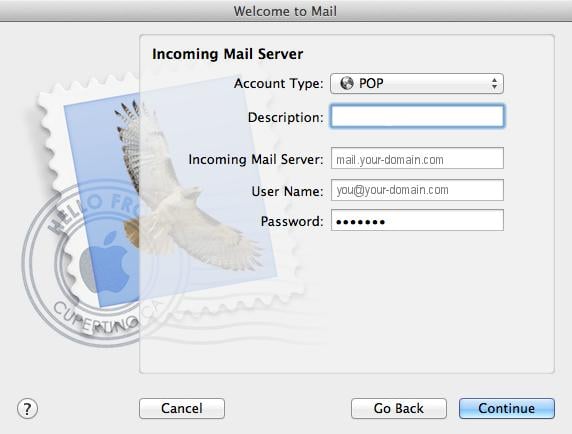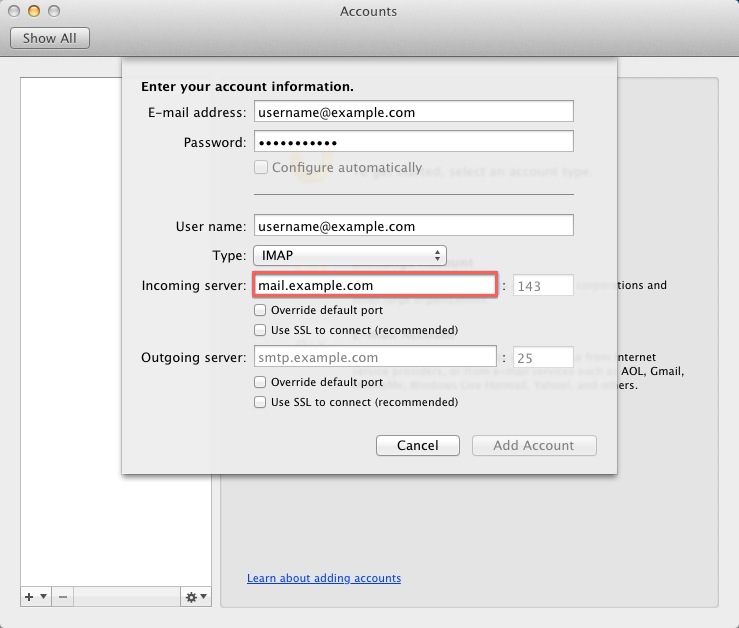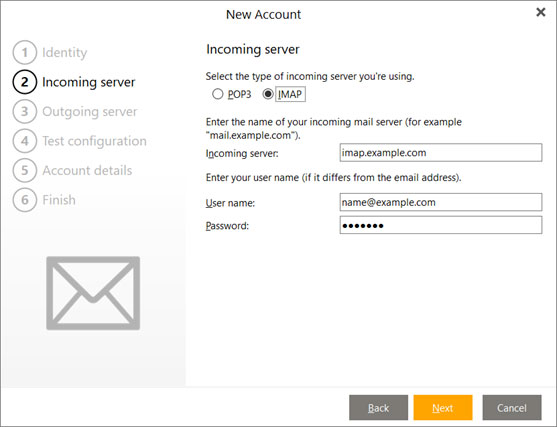- Select Outgoing Server Enter SMTP server name box, type the server name that applies to your account: mail.optonline.net or mail.optimum.net Remove check from both Use Secure connection and Verify Certificate (you may need to adjust after set-up if not able to send an email) Port - 587.
- If your email app or client didn’t set up the servers automatically after you provided your email address, you will need to manually enter the incoming (IMAP or POP) and outgoing (SMTP) mail servers. IMAP is recommended for the incoming. Incoming servers: imap.windstream.net port: (SSL) 993; port:143; pop.windstream.net port: (SSL) 995; port:110.
- Use Server Settings preferences in Mail to change options for an account’s incoming and outgoing (SMTP) mail servers. To change these preferences in the Mail app on your Mac, choose Mail Preferences, click Accounts, then click Server Settings. Note: The settings you see vary depending on your account type. Incoming mail server settings.
Searching for the AOL mail settings to set up your AOL mail account?
Write down the corresponding email server settings in the empty column. Return to your email app and enter the information to complete your email setup. Manually Set Up Mail for a Gmail Account. Old versions of Mail (2.x and earlier) didn't have an automated method for setting up a Gmail account. You can still create a Gmail account in Mail, but you need to set up the account manually, just as you would any other IMAP-based email account. The settings and information you need are.
To send and receive your AOL mail from another email program, you’ll first need to set up your AOL server settings.
But if you haven’t done this before, it can seem like a super-complex process.

Don’t worry.
This article includes all the details you need to do this easily.
I’ll include the SMTP settings as well as the POP and IMAP setting to set up an AOL email address. And for those of you who are new to these terms, I’ll also explain what SMTP, POP, and IMAP are, and how you can set them up for your AOL email program.
This article contains:
(Click on a link below to jump to a specific section.)
- AOL Mail Settings
If you only need your AOL mail setting without the rest of the information, here you go:
AOL Mail Settings
Here are the SMTP and POP/IMAP settings for AOL mail:
1. AOL SMTP Settings
SMTP Server name: smtp.aol.com
SMTP Port: 465
Encryption: TLS/SSL
SMTP Username: your entire AOL email address (including the “@aol.com”)
SMTP Password: your AOL password
2. AOL POP Mail Setting
AOL Server name: pop.aol.com
Port Number: 995
Encryption: SSL
3. AOL Mail IMAP Server Settings
IMAP Server: imap.aol.com
Port: 993
Encryption: SSL
Note: For AOL users who migrated to AOL’s email service with Verizon email, check out my article on How to Set Up Verizon Email Settings to set up your mail account.
For the rest of us, let’s get started!
What Is SMTP?
SMTP is a protocol needed to set up your AOL email account in another email client.
But what exactly is a protocol, and how does SMTP help you?
A protocol is a set of rules that dictates how communication takes place, or how information is sent between one email account and another.
Simple Mail Transfer Protocol, or SMTP, is a protocol used by email software to send outgoing mail to the recipient’s email account via your email provider.
Ajay’s Email TipInterested in knowing more about SMTP? Check out this detailed guide. |
How does this work?
SMTP uses a Mail Transfer Agent (known as the SMTP Relay), which ensures that all your mail is sent to the right email account.
If you don’t know the right email address of the person you want to email, a good email finder tool can help you. Click here for a list of the top five email finder tools available today.
The SMTP Relay helps send email from SMTP clients, which are the email programs you use, to each SMTP mail server.
What is an SMTP mail server?
An SMTP mail server is any computer that runs SMTP!
These servers make sure your email message takes the correct route to your recipient’s mail application. Each email moves from server to server until it reaches its destination.
By the way, to discover how to track your outgoing mail accurately, check out this article on the best email tracking software you can use in 2020.

SMTP uses a set of commands that simplify this email sending process between multiple servers. However, it can’t transmit attachments — only text.
So how are your attachments sent?
Usually, the Multipurpose Internet Mail Extension (MIME) protocol comes into play here. It encodes the non-text data into text before sending an email through your email provider to your primary, CC, and BCC recipients.
What’s the difference between primary and BCC recipients?
BCC refers to “Blind Carbon Copy,” and helps you send emails to recipients discreetly. But you shouldn’t use BCC to send emails to multiple recipients. Check out this guide to using BCC correctly for your emails.
What are POP and IMAP?
As SMTP deals only with sending outgoing mail, you need something to receive incoming mail on your mail application inbox as well, right?
That’s where POP and IMAP help you. You can set up your incoming mail server to receive all email messages through your email provider using either the POP or the IMAP protocol.
Let’s take a look at how these protocols work:
A. POP
POP stands for Post Office Protocol, which is used to receive incoming mail. The current version that’s widely in use is POP3.
POP3 is great for personal computers as it downloads incoming emails to the local device any time you want to check your mail. This way, you don’t have to be online to check your emails!
B. IMAP
The Internet Message Access Protocol, or IMAP, is another protocol that’s used to receive incoming emails from your email service.
Unlike POP, IMAP saves all of your incoming emails on a server. Every time you check your inbox, your email program contacts the incoming mail server and lets you access your email from any device with an internet connection.
Essentially, your IMAP server acts as cloud-based storage for your emails. That’s why IMAP is considered a more efficient and faster alternative to POP3.
POP3 vs. IMAP
To sum it up, POP3 downloads incoming mail to your local device while IMAP stores them on a server. This makes IMAP a more efficient option.
However, IMAP requires a stable internet connection every time you want to check your emails, while POP allows you to check your inbox offline.
How to Set Up Your AOL Server Settings
Now that you know how each protocol helps, let’s see how you can add account settings in an email client, such as Microsoft Outlook or Mozilla Thunderbird, etc.
In most cases, your email app allows you to set up SMTP and POP/IMAP via your account settings in the mail app you’re using.
All you need to do is add your AOL account to the email application and enter the SMTP and POP/IMAP parameters in your account settings to set up your incoming and outgoing mail server.
For example, here’s how you can go about a manual setup for these protocols in Microsoft Outlook (previously known as Hotmail) account settings:
1. SMTP
Open your Microsoft Outlook mail app.
Go to File > Info > Account Settings > Server Settings.
Then, click on Outgoing Mail and enter the relevant settings.
AOL SMTP Settings
AOL Server name: smtp.aol.com
Server Port: 465
Encryption: TLS/SSL
SMTP Username: your entire AOL email address (including the “@aol.com”)
SMTP Password: your AOL password

You can use the same outgoing server email setting to set up your AOL email for a Mac or Windows 10 mail app, an Apple iPhone or Android mobile app, or a web browser program. Now you’re all set to begin writing the emails you need to send from your email program!
If you need help with starting your emails, here’s a handy guide that tells you everything you need to know about how to start your emails.
2. POP and IMAP
After you’ve set up your SMTP settings in your mail app, you can begin sending outgoing mail from your AOL email account.
However, you still need POP or IMAP email settings to receive incoming mail from your email service!
Luckily, just like setting up your SMTP settings, this is a piece of cake.
For Outlook, navigate to File > Info > Account Settings > Server Settings.
Configuring Incoming And Outgoing Email Servers On Mac For Optimum Internet
Then, click on Incoming Mail and enter the network settings.
Here are the AOL email settings you need to set up either protocol for your AOL inbox:
AOL POP Settings
Configuring Incoming And Outgoing Email Servers On Mac For Optimum Settings
AOL Server name: pop.aol.com
Server Port: 995
Encryption: SSL
AOL Mail IMAP Setting
IMAP Server: imap.aol.com
Server Port: 993
Encryption: SSL
Once you’re done arranging your incoming mail server account settings, you should begin receiving your AOL email on your email app as well.
Conclusion
Configuring Incoming And Outgoing Email Servers On Mac For Optimum Mail
While AOL webmail features a powerful email client of its own, it’s easy to set up your AOL email account on any email app of your choice.

Simply follow the steps I’ve covered in this article to enter your settings, and you’re all set to manage your AOL email from your preferred mail application!
Configuring Incoming And Outgoing Email Servers On Mac For Optimum Password
Ajay is the founder of GMass and has been developing email sending software for 20 years.